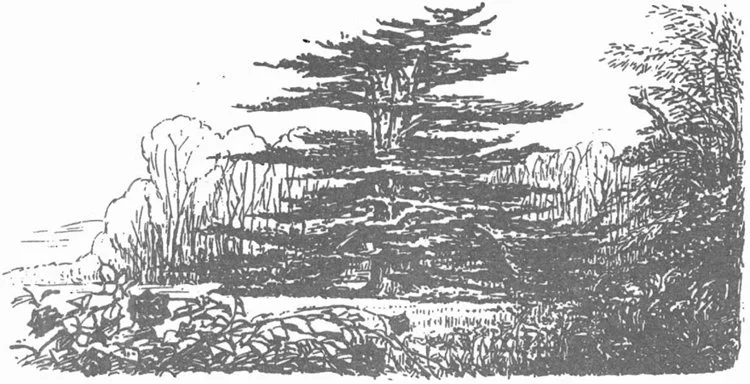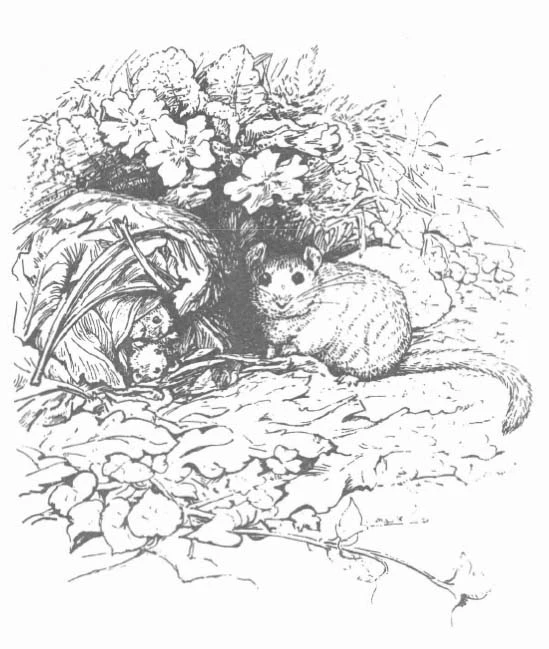But their real name is folk’s gloves; fairy gloves. The good folk, the fairies, wear them.’ ‘Tell me about the fairies, Xarifa.’ ‘Another time I will, Tuppenny; my seam is finished, and Jenny Ferret is boiling the kettle for tea.’

Chapter 7
Springtime in Birds’ Place
Spring advanced. The caravan wandered along green ways. Primroses were peeping out at the edge of the coppice; the oaks showed a tinge of gold; the wild cherry trees were snow-white with blossom. Beech trees and sycamores were bursting into leaf; only the ash trees remained bare as in midwinter. The ash is the last to don her green gown, and the first to lose her yellow leaves; a short-lived summer lady. On the topmost bare branch of an ash sat a throstle, singing loud and clear – so clear that he seemed to sing words. ‘Fly here! fly here! fly here! Will-he-do-it? Will he do it?’ shouted the throstle: ‘Come bob-a-link, come bob-a-link! Sky high! Sky high! so – so – so.’ ‘Oh greenwood tree sweet pretty lea!’ warbled a blackbird softly. ‘Spring is here! is here!’ shouted the throstle, on his tree top.
Xarifa and Tuppenny sat listening on a sunny bank below: ‘Birds; sweet singers all! The coppice is full of birds. Hark to the blackbird in the hawthorn; see his yellow bill. Now he pauses, waiting for an answering blackbird, far away in the wood. It reminds me of Birds’ Place in spring.’ ‘Where is Birds’ Place, Xarifa?’ ‘Listen while he sings his song again.’ The blackbird sang. A soft cloud dimmed the sunshine; a few large raindrops fell. The birds interrupted their singing and flew down onto the grass; all except little Dykey Sparrow, singing to his wife, while she sat on her blue speckled eggs.
‘Where is Birds’ Place, Xarifa?’ ‘Birds’ Place that I remember was in Hertfordshire, long ago when I was young. Perhaps the elms and chestnuts have been felled; the passing swallows say the cedar is blown down. Birds’ Place had been the garden of an old, old manor house. No brick, no stone was standing; but still the straggling damask roses bloomed, and garden flowers grew amongst the tall untidy grass. Currant and gooseberry bushes had run wild in the thicket; they bore the sweetest little berries that the blackbirds loved. No one pruned the bushes, or netted them against the birds; no one except birds gathered the strawberries that were scarcely larger than wild white strawberries of the woods. It was a paradise of birds.
‘The outer side of the grove was bounded by a high close-latticed wooden fence, gray green and lichen grown; with rusty nails along the top, that kept out village boys and cats. Birds and butterflies and flowers lived undisturbed in that pleasant green wilderness that had once been a garden. And in the middle of the mossy grass plot stood the glory of the garden – the great cedar. Its head towered high above the self-sown saplings of the grove; its wide spreading lower branches lay along the mossy grass, where orange-tip butterflies flitted, and red-tailed velvety bees gathered honey from the cowslip flowers.
‘Spring following spring a pair of missel thrushes built their nest upon a branch low down, and the ring doves nested and cooed higher up. Starlings and nuthatches reared their broods in holes about the trunk; the great cedar was large enough for all. The grove was carpeted with flowers, ground ivy, forget-me-nots, blue periwinkle. Amongst the bushes grew peonies and sweet-smelling day-lilies of the old garden, along with wild flowers; cow parsley, and white stitchwort that we called “milk maids”, and pink ragged-robin, and cuckoo pint that is called “lords and ladies”; and everywhere primroses amongst the moss.
‘There, in a nest thatched with brown chestnut leaves, I was born; I and my little dormouse sister and brother.’ ‘What were their names, Xarifa?’ But Xarifa continued – ‘Never, never anywhere have I seen so many flowers or listened to so many birds. Even at night when it was dark, and our mother had closed up the opening of our nest with plaited leaves and grass – even in the deep black velvety darkness came the low slow note of a bird. I do not think that the nightingale’s is actually sweeter than a blackbird’s song; but it is weird and wonderful to hear it in the black silence of the night. There are no nightingales up here in the north, Tuppenny; but there are bonny songsters never-the-less. Father Blackbird in the hawthorn bush made me think about Birds’ Place.’

‘In a nest thatched with brown chestnut leaves I was born.’
‘Tell me about the nest and your little dormouse brother and sister?’ But Xarifa did not answer; she had fallen fast asleep, dreaming peacefully of springtime in Birds’ Place.
‘Tuppenny! Tuppenny!’ called Jenny Ferret, ‘come and help me to spread the tea things underneath the caravan; spring showers can be uncommonly wetting’ ‘Tuppenny,’ said Pony William, munching mouthfuls of grass between his words, ‘Tuppenny do not – ask Xarifa questions about her dormouse sister and brother – she suffered from a distressing want of appetite – when she first travelled with us.
1 comment